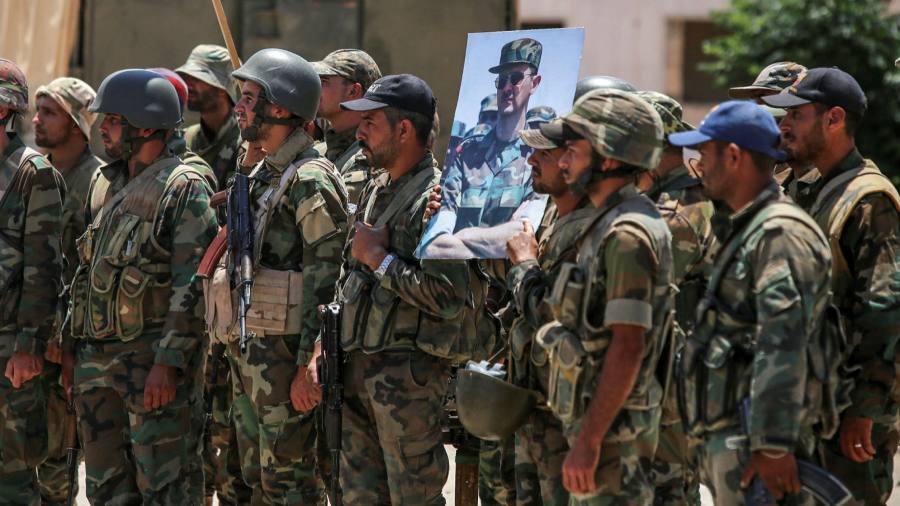[ad_1]
In Syria’s coastal towns, memorials to dead soldiers mark the sacrifice made by the Alawi minority to defend President Bashar al-Assad, also an Alawi. But, more than a decade since the civil war began, his regime is struggling to keep even the lights on in his heartland.
The war wrecked much of Syria and, with authoritarian Assad in control of two-thirds of the country, an unprecedented economic crisis risks destroying what remains — including for Alawis, whose men the regime relies on to staff its all-powerful secret police and fight in its army.
Like all Syrians, Alawis are struggling with impoverishment, rolling blackouts, shortages, the plunge in the currency and unemployment. The economic collapse, brought upon by war and sanctions, has been exacerbated by Covid and a financial crisis in neighbouring Lebanon, its banking lifeline.
“I don’t know how to explain the awful situation now,†said one student, 22, from Alawi-majority coastal city Lattakia, who makes around $10 per week tutoring and lives off remittances from a brother in Germany. “May God help those who don’t have anyone who sends them money from abroad,†she added. She did not want her name published for fear of retaliation.
Alawis, a historically marginalised sect that makes up just 15 per cent of Syria’s 17m population, have long been considered a bedrock of loyalists for the regime in the Sunni-majority country.
Since Bashar’s father Hafez took power in a 1963 coup supported by fellow Alawi army officers, the Assads have staffed security and intelligence services disproportionately with Alawis. With the country’s mercantile bourgeoisie largely Sunni and Christian, the state became the Alawis’ main source of lucrative jobs.
When Assad opened up Syria’s economy, after decades of his father Hafez’s isolationist economic policies, “there was kind of an improvement overall of living standards, for state employees in particular and Alawisâ€, said Elizabeth Tsurkov, a fellow at Newlines Institute.
It is unsurprising then that the Alawi-majority coastal areas of Lattakia and Tartous did not rise up against Assad in 2011 and, as a result, were spared the war’s worst violence. As a religious minority, they had much to fear from a revolution that began with democratic protests but was overtaken by Islamist forces, who consider the unorthodox Muslim Alawis as heretics.
“We were let down as revolutionaries under the shadow of this black flag,†said one writer, 70, from an Alawi family, referring to the symbol of Isis and other Islamist extremists.
Economics, rather than sectarian loyalty, lay behind the Alawi community’s alignment with the Assads, said Alex Simon, Syria director at Beirut-based research firm Synaps. The “state . . . became the primary vehicle, if not for economic mobility, then livability,†for the Alawis, he said.
But those ties are now being strained. Posts on neighbourhood Facebook pages for Alawi-majority towns offer a window into local grievances — from electricity that works just a few hours a day and severe fuel shortages, to unaccountable officialdom failing to address service failure.
With inflation soaring, as Syria’s currency has dropped from around 50 SYP to the dollar before 2011, now hovering around 3,500 SYP after a recent steep devaluation, salaries of soldiers and government employees are worth a fraction of what they once were. “Now it’s really back to [ . . . ] conversations about how life is constant humiliation,†as it was under Hafez’s socialist Ba’ath party, said Tsurkov.
Although almost no one dares publicly chastise the president, many feel abandoned by Assad.
“The regime is barely dealing with the [economic problems],†said a translator and volunteer with cultural initiatives, 38, from Lattakia.
“The state has turned into a collecting machine, especially in the last two years, taxes and fines have become hysterical because the government is bankrupt.†While some “support the regime . . . out of ignorance and fear,†the volunteer believed the economic situation had weakened their faith: “people have lost their religionâ€.
Still state repression makes Alawis assent to the regime. “Every once in a while, the dead bodies of tortured detainees are sent to their families,†said the writer. “The generation that remained in Syria saw the fear and the oppression, they wouldn’t be able to rise. The security grip is too tight.â€
Syrians “have been reduced in [their] vast majority to destitution and suffering,†said Geir Pederson, the UN’s top diplomat on Syria. More than 60 per cent of the population cannot access enough food, says the UN’s food agency, and 13m people survive on aid.
However much Alawis and other Syrians suffer, Tsurkov said a return to widescale protests are unlikely: “the regime has been able to demonstrate to Syrians that they will surrender, that they will comply . . . everyone knows that this is intolerable, yet nobody is doing anythingâ€.
While violence may have slowed in Syria, day to day horror has not. “I saw a child [lying] next to the rubbish bin. I thought he was dead and tried to move him, but it turned out he was alive,†said the writer, who lives near Damascus.
[ad_2]
Source link






